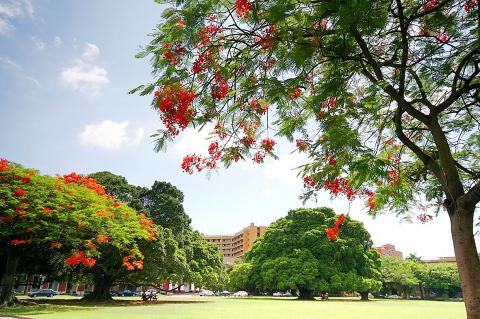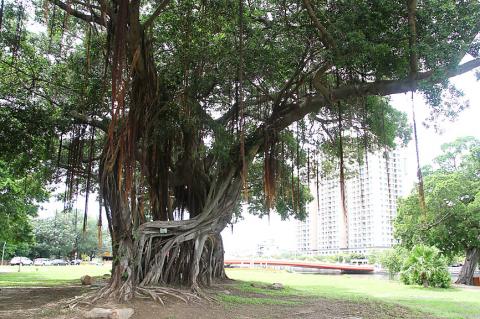While there are plenty of old banyan trees in Taiwan, none can be said to enjoy quite the same level of fame as a centennial banyan that grows at Greater Tainan’s Cheng Kung University and was the inspiration for Cathay Life Insurance Co’s tree-shaped logo.
Visitors stepping onto the university’s Guangfu campus are met with the sight of an idyllic meadow to their right, in the middle of which towers the imposing mushroom-shaped banyan. The 100-year-old tree is so massive that it dwarfs all the other banyans on campus.
It is said that the real-life Cathay Life banyan was planted by Japanese Emperor Showa in 1923 and that it is indigenous to Japan’s Kagoshima Prefecture.

Photo taken from Cheng Kung University’s Facebook page
Even so, the giant tree is not that special in the eyes of many locals, who are accustomed to the centennial banyans — a type of fig tree — ubiquitous across parks in Greater Tainan, standing out only for its sheer size.
As any celebrity knows, the road to fame often presents itself when one least expects it and so it was with the Guangfu banyan.
In 1995, Cathay Life donated NT$1 million (US$33,333) to adopt the tree and designed its trademark logo based on the tree’s mushroom-like silhouette.

Photo: CNA
Alongside the slogan: “Bury your roots deep to reach high,” the titanic banyan began appearing in print advertisements and TV commercials for the insurer nationwide, earning it overnight fame.
As a result of this publicity, tourists have swarmed to the university to marvel at the tree for the past 20 years, while the school’s administration often allows its banyan grove to be used a venue for events.
Cathay Life’s banyan has also became a landmark of Greater Tainan and a popular spot in which to play basketball, have a date or engage in a myriad of other leisure activities.

Photo: CNA
The banyan is not Taiwan’s only “celebrity” tree: A red cedar that grows at the end of Taitung County’s Brown Avenue also rose to fame, gaining nationwide recognition after Taiwanese-Japanese actor Takeshi Kaneshiro (金城武) was filmed having tea underneath it in a globally televised EVA Airways commercial earlier this year.
The cedar has since been dubbed the “Takeshi Kaneshiro Tree.”
The commercial, shot in Chihshang Township (池上), featured the superstar serving tea and cooling off under the shade of the red cedar. The ad became an overnight sensation as its depiction of leaving the busy city life behind to be immersed in nature resonated with many.
Wu Hsiu-lan (吳秀蘭), who owns the red cedar, said her father planted the tree 40 years ago so he and his buffalo could cool off in its shade.
The cedar’s popularity even prompted the Chihshang Township Office to list it as a cultural site and control traffic on the avenue running alongside it — an unprecedented move given that the avenue is listed as an agricultural road.
The tree, which has the potential of generating annual profits of up to NT$700 million, sparked a wave of panic when it was uprooted by Typhoon Matmo late last month.
Fortunately, thanks to the special attention it received from horticulturalists, it has been restored to an upright position.
Another famous banyan rivaling the Cheng Kung University landmark is the “lovey-dovey tree” that sits by the Greater Tainan canal.
The tree found instant fame after it was featured in several scenes of last year’s Taiwanese blockbuster Zone Pro Site (總舖師).
In one of the scenes, the film’s protagonists, A-hai (阿海) and Hsiaowan (小婉), a young couple, sit on top of the banyan’s roots, transforming it into a popular date spot overnight. Couples from across Taiwan now come to Greater Tainan to take pictures sitting on the tree’s roots.
Greater Tainan Tourism Bureau Director Chen Chun-an (陳俊安) said that despite the film star tree’s high profile, the city government chose not to further publicize it or establish any infrastructure in its surroundings because it wants to preserve the banyan so it continues to be the same healthy, imposing tree seen in the movie.
Stressing the importance of conservation, Chen urged visitors to bear in mind that the “lovey-dovey tree” may not be fit for climbing due to its age, suggesting that they just photograph it from a distance.

‘DENIAL DEFENSE’: The US would increase its military presence with uncrewed ships, and submarines, while boosting defense in the Indo-Pacific, a Pete Hegseth memo said The US is reorienting its military strategy to focus primarily on deterring a potential Chinese invasion of Taiwan, a memo signed by US Secretary of Defense Pete Hegseth showed. The memo also called on Taiwan to increase its defense spending. The document, known as the “Interim National Defense Strategic Guidance,” was distributed this month and detailed the national defense plans of US President Donald Trump’s administration, an article in the Washington Post said on Saturday. It outlines how the US can prepare for a potential war with China and defend itself from threats in the “near abroad,” including Greenland and the Panama

A wild live dugong was found in Taiwan for the first time in 88 years, after it was accidentally caught by a fisher’s net on Tuesday in Yilan County’s Fenniaolin (粉鳥林). This is the first sighting of the species in Taiwan since 1937, having already been considered “extinct” in the country and considered as “vulnerable” by the International Union for Conservation of Nature. A fisher surnamed Chen (陳) went to Fenniaolin to collect the fish in his netting, but instead caught a 3m long, 500kg dugong. The fisher released the animal back into the wild, not realizing it was an endangered species at

The High Prosecutors’ Office yesterday withdrew an appeal against the acquittal of a former bank manager 22 years after his death, marking Taiwan’s first instance of prosecutors rendering posthumous justice to a wrongfully convicted defendant. Chu Ching-en (諸慶恩) — formerly a manager at the Taipei branch of BNP Paribas — was in 1999 accused by Weng Mao-chung (翁茂鍾), then-president of Chia Her Industrial Co, of forging a request for a fixed deposit of US$10 million by I-Hwa Industrial Co, a subsidiary of Chia Her, which was used as collateral. Chu was ruled not guilty in the first trial, but was found guilty

DEADLOCK: As the commission is unable to forum a quorum to review license renewal applications, the channel operators are not at fault and can air past their license date The National Communications Commission (NCC) yesterday said that the Public Television Service (PTS) and 36 other television and radio broadcasters could continue airing, despite the commission’s inability to meet a quorum to review their license renewal applications. The licenses of PTS and the other channels are set to expire between this month and June. The National Communications Commission Organization Act (國家通訊傳播委員會組織法) stipulates that the commission must meet the mandated quorum of four to hold a valid meeting. The seven-member commission currently has only three commissioners. “We have informed the channel operators of the progress we have made in reviewing their license renewal applications, and